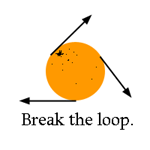

 | Tangentium |
May '05: Menu
All material on this site remains © the original authors: please see our submission guidelines for more information. If no author is shown material is © Drew Whitworth. For any reproduction beyond fair dealing, permission must be sought: e-mail drew@comp.leeds.ac.uk. ISSN number: 1746-4757 |
Information literacy: empowering the learner "against all odds"Susie AndrettaPage 1 ¦ Page 2 ¦ Page 3 ¦ Printer-friendly version Tutors as facilitators of learning: the never-ending cycle of practice and reflectionThe learning-how-to-learn approach, promoted by information literacy education, is firmly rooted in problem-solving and critical thinking practices that are found problematic by students and educators alike. However, Richard Paul attributes the reluctance on the part of the learner to engage with the critical thinking process to the unwillingness of the educators to integrate critical thinking and problem-solving approaches in their practices for the simple reason that these methods are "effortful" [21]. Information literacy practice in DASS confirms that adopting a learning approach that fosters critical and lateral thinking is time consuming and needs constant editing of formative activities to take account of the dynamic nature of the information systems used [22]. Similarly, the iterative process of learning, also promoted by information literacy, places an emphasis on formative assessment practices and a considerable burden on the educator to provide immediate feedback either online or face-to-face. In most cases the time spent generating this feedback is not included in the educatorís workload and therefore the effort underpinning information literacy provision is not acknowledged. The following data give an indication of the amount of work required to support students online that is outside the timetabled activities. At undergraduate level, for example, a cohort of approximately 150 students generates on average 500 email messages that provide student-support at the topic formulation stage of two assessed tasks. Similarly, the employment of three formative assessment exercises in AIR for a cohort of approximately 40 students can generate in excess of 100 scripts. Here feedback needs to be given within a short time after submission to maximise its benefit to students. Empowerment seen from the learnerís perspectiveDespite the many difficulties encountered when attempting to empower the learner, the positive impact of this approach on the students is evident from the comments they make at the end of the information literacy provision. The main theme that runs across most of the feedback shows that students travel from uncertainty and confusion to a level of increased confidence in their ability to apply their information literacy competences beyond the module they have completed. Not surprisingly, postgraduate students emphasise the issue of transferring these competences to other modules and beyond to their professional environment: "The AIR module has furnished me with useful transferable skills. What are needed now are opportunities for practice and reflection Ė not only in my dissertation but also in my future career." Similarly, other students comment on the way the AIR module has improved their supporting role by raising their awareness of usersí needs as opposed to simply acting on untested assumptions. When asked about the impact of AIR on current information practices a student replied: "A great deal working in a public library in a diverse London Borough. It will enable me to look at the community from their perspective and provide them with what they want, not what I think they need!" Increased confidence also seems to permeate the working relationships that librarians develop with other professional groups, and to prepare them for lifelong learning conditions: "[AIR] has given me a greater confidence when dealing with academics/academia. It has made me look, increasingly, to evidence-based decision making when confronted with changes in the work environment." At undergraduate level the empowering effect of information literacy is often associated with the development of independent learning and improved academic performance: "The information literacy module enables students to learn very important skills which are needed for studying at University. It encourages self-discipline... I feel I have benefited considerably from this module as it has enabled me to develop skills which will be beneficial for my forthcoming studies... I have learnt different ways of retrieving information which I did not know before and I have also learnt to work more independently." Although information literacy at undergraduate level is sold to the students as a way of enhancing their studies and get a better degree, some also appreciate the transferability of these competences beyond academia: "The fundamental aim of the module is to develop our handling of information. After taking this module, I believe that I can now handle and use information effectively both for my degree and in other areas of life. " ConclusionThis paper has attempted to illustrate the many challenges faced when adopting the information literacy approach as a framework for learning. At present, empowering the learners often feels like betting on the underdog. One would hope that in the not so distant future the impetus from lifelong-learning will encourage the development of a supportive learning environment in HE institutions that will enable us to even the odds. Footnotes21. Paul, Critical Thinking, op. cit., p. 23. return 22. Andretta, Information Literacy, op. cit. return | |